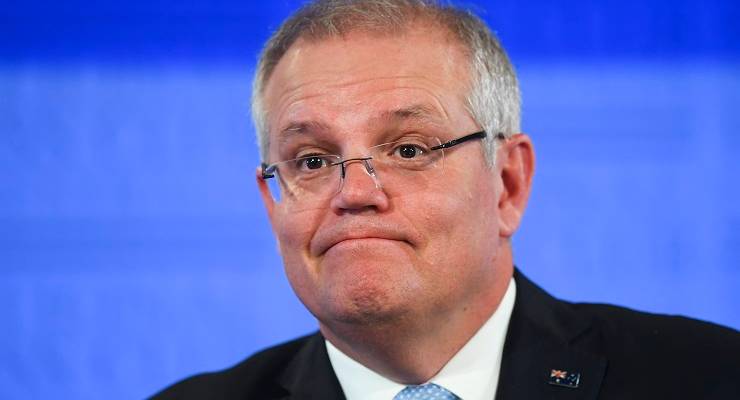
The Morrison government’s announcement of a $270 billion investment in long-range ballistic missiles was delivered with a pitch about the fractious relationship between China and the United States and a broadly unstable geopolitical global environment.
Our traditional concept of threat and national defence is often framed in terms of military hardware and capability. But something else has been far more destabilising to democracy and East-West relations over the past decade: the rise and weaponising of digital technology.
Russia has engaged in a long campaign to undermine Western military and political alliances such as NATO and the EU, and foment instability.
A cursory look across the European and American political map would seem to indicate that campaign has been low-cost but successful. Extreme political organisations in the West have been funded and supported by Russia to destabilise digital campaigns that polarise Western democracies.
Traditional media is crumbling
The good news: people still see a central role for traditional media. This has become particularly evident during the COVID-19 crisis. In Australia the top 10 news sites surged by 54% during March. The ABC almost doubled its audience from 5.1 to 9.8 million in the four weeks from February 23.
The bad news: the pillars of traditional media are crumbling. AAP, Nine newspapers, 10 Daily, News Corp regionals, and the ABC are just some of the media recently affected by cuts.
People can only turn to trusted media sources if they are financially viable and continue to exist.
The health and survival of traditional media outlets is important not only for variety, but for public trust.
The traditional media landscape is Balkanising and fracturing just as malicious digital agents are dumping enormous amounts of propaganda and dangerous ideas into the news cycle — from COVID-19 not being real to anti-vax messages, 5G conspiracies, and race hate.
By the time the dwindling traditional media has sorted through this pile of garbage, another truck is backing up with a fresh load to dump. It’s a growing garbage heap that can never be sorted with the resources our media have, but it’s time to look at the dump trucks: social media platforms.
We need urgent regulation
It’s time for regulators to catches up with digital innovation and governments to make social media platforms like Facebook and Twitter financially and legally liable for their content.
We’ve seen recently Twitter CEO Jack Dorsey step up in a small way to tag some of Trump’s posts as requiring a fact check. Mark Zuckerberg’s Facebook has a significant way to go. And its lack of action is starting to have material impacts: Coca-Cola and Unilever are some of the big brands that have recently pulled all their ads out of Facebook due to a lack of responsibility and oversight.
Whether it likes it or not, Facebook is a news delivery platform. It seems to have no problem taking down images of women breastfeeding or other instances of non-pornographic nudity, yet highly repellent, inflammatory, hate-inciting and dangerous content stays.
If anyone doubted a healthy media’s importance to democracy, it should be abundantly clear now. The government must work with the media to find a model to financially support trusted news sources that are liable for the content they produce, and to make the social platforms that aren’t answerable for their content.
The greatest threat to Australia’s security lies within the media space — and the health of our democracy depends upon the government supporting it.
David Latham is a public relations manager and lobbyist.
Are you concerned about the threat social media poses to democracy? Let us know your thoughts by writing to letters@crikey.com.au. Please include your full name to be considered for publication in Crikey’s Your Say section.








No mention of the abuse of position – to peddle mis/disinformation from political ideology – of conventional partisan (including foreign owned) media?
Media that carries on like subjective social media as it’s m.o.
… by “a public relations manager and lobbyist.“.
WTF is wrong with creeky – is it really so hard to find writers?
First Toby jug now this thinly veiled demand not at all written to order to go back to the past?
If you put sensible regulations in to place to take down or respond with fact the garbage on social media ,sooner or later people will start looking at mainstream media with the same criteria.
That’s something that our mainstream media regulators would take a dim view of as it would interfere with their own agenda.
Anyone who doesn’t recognize that cultivating fear with very little basis in fact and gaining monetary/political advantage by doing so is par for the course hasn’t been watching the telly for the last 40 years.
Not to mention advertising/ selling fat and sugar with no regards for public health, we pay for all of it via physical and mental health socially and financially.
How can you regulate against fear campaigns when our own government /marketing/news outlets do exactly the same thing?
We desperately need a pubicly owned media outlet big enough to compete, or our mainstream media regulators act to be cleaned up.
Could this be the light at the end of the tunnel?
“We desperately need a pubicly owned media outlet big enough to compete…” I have an idea. We could legislate to set up a well funded, independently run national media organisation with plenty of on line platforms and free to air radio and TV. It could be called something like, let me think, what about the “Australian Broadcasting Corporation?” Oh, is that copyright? There already is one? Oh, there was one. What happened to it then?
Rais ,the ABC is at the mercy of the incumbent government, the Boyer lectures in 1995 that allowed Eva Cox [no relation] to talk about the decay of social capital caused by the Neocons and economic rationalists, both parties, was Labor.
I think it is fair to say Labor has a better record of allowing discussion that doesn’t fall into line with their agenda or financial influences.
I’m thinking publicly owned as in not for profit and independent of the government of the day.
It wouldn’t want to devote itself completely to taking on market/ political driven media agenda but there is a lot of important material there, such as what this article and comments refer to.
Are you thinking of something along the pattern of the US not for profit networks NPR (radio) and PBS (TV)? The bare bones of an independent radio network might be here with many small community radio stations. Those US networks depend partly on government funding though and it shows in NPR’s obsequious interviews with government officials when it has any at all. There’s certainly nothing like the astonishing Chris Wallace interview with Trump that’s making headlines today. Not that Wallace can undo the damage that he and the rest of Fox have done in the last few years.
It would be nice to be able to refer to a reliable reference that kept up with and responded to questions in regards to a stories integrity.
Like a fact checking sense of security that meant that you were building your understanding of current and past events on fact that hadn’t been first filtered through someones political/marketing agenda that had selfishness and greed as motivation.
A ramped up factcheck community run organisation that paid people to work in and explore the fields they have a passion for.
That also worked on creating a platform and reference for ideas that were aimed at restoring democracy and social capital ..trust.
The opposite of cultivating fear for money while selling off public assets and stripping or removing government platforms designed to support people on all income levels.
The idea that tax does improve everyone’s life, not the opposite.
Such as the issues that the issues BIll W below mentions , the sort of subject matter that drives many of us here a little spare.
Conservative governments will never move to clean up dirty media of any type, not so long as it benefits them over any progressive attempts at forming government. Quite the opposite.
The history lesson arising from the release of the Palace letters highlights once again how quickly the entire for-profit media gangs up any government that tries to curb their ability to make a profit from the frightened masses.
Fair enough. Let’s have a proposal from David on how it’s to be done. Not just a simple ‘governments must regulate’, but a detailed technical description of what will be done to make it work. Who will be responsible for what and when, and who will decide whether the changes are acceptable or not? Who are the gatekeepers and who are the guards?
What, exactly, is being proposed here?
“Hold onto Nanny government for fear of something worse”?
The sewer of social media requires effective international cooperation, precisely at a time when Trump, Johnson, Morrison et al are actively disempowering international cooperation.
Trump’s EO on this subject smacks of blatant self interest, but is on the money. If social media monitors or edits our posts, it can’t reasonably claim safe harbour.